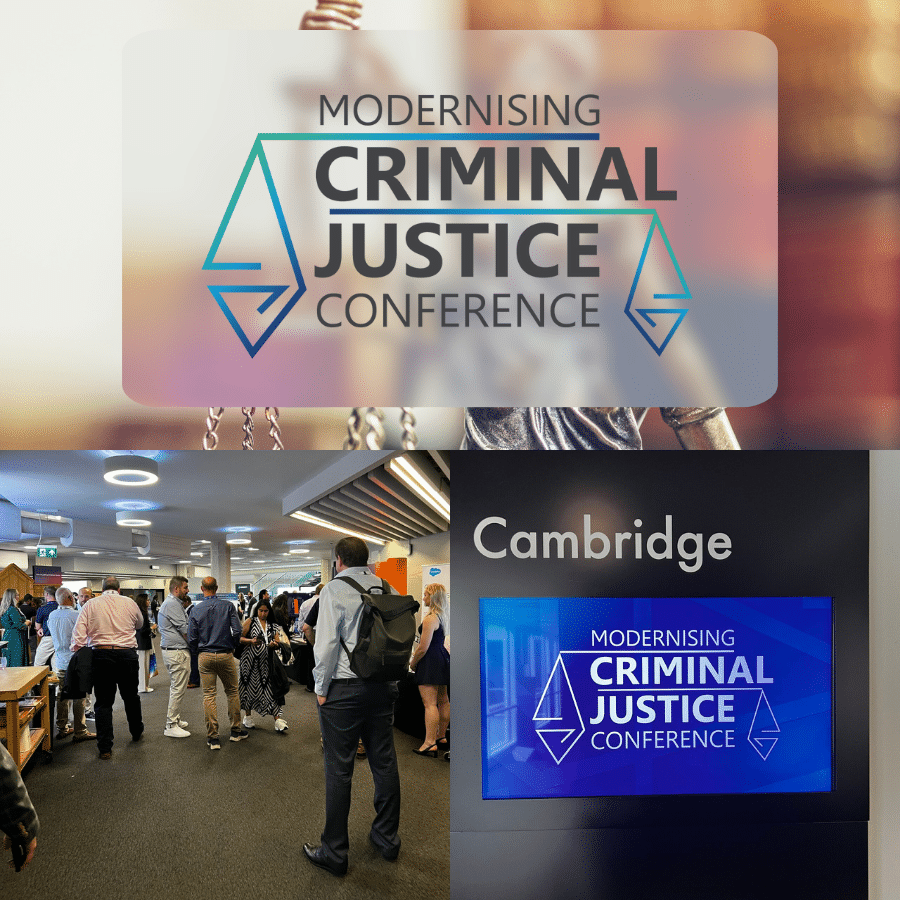Published by Skills for Justice
Creating a sustainable criminal justice workforce
Date 03.07.25

The criminal justice system is at a critical juncture. Faced with increasing workloads, rising attrition, and a workforce under pressure from all sides, the question is no longer whether we need to act, but how.
At the recent Modernising Criminal Justice Conference, representatives from across the sector – including courts, prisons, probation, and the legal profession – came together to explore how the system can adapt and build a more sustainable workforce. The panel discussion highlighted both progress and the pressing need for further change.
Recruitment: More than just filling vacancies
Recruiting into the criminal justice system has always been complex, but the challenges today are unprecedented. There’s growing recognition that recruitment is not just about filling vacancies but about finding the right people for the right roles with the right skillset, and those that have resilience and clarity to thrive in demanding environments.
Clarity in job descriptions, transparency about what roles entail, and early engagement with potential candidates are all helping manage expectations and reduce early attrition. Initiatives like pre-recruitment ‘taster sessions’ and providing interview questions in advance are proving effective. These approaches aim to remove unnecessary barriers and allow candidates to demonstrate their knowledge and potential, rather than just their interview skills.
There’s also a growing acknowledgement that traditional recruitment models haven’t worked well for underrepresented groups. Building trust, addressing misconceptions, and investing in outreach are essential to broaden the talent pool and reflect the communities the justice system serves.
But the question remains – how do we ensure that we’re recruiting the right people, for the right roles with the right resilience to work in the criminal justice system? It all comes down to effective and strategic workforce planning, not just for the short term or to deal with the current issues, but to adequately forecast changes and subsequent workforce needs well into the future.
Jon Freegard (Client Delivery Director at Skills for Justice) notes “Effective workforce planning enables organisations to reduce the gap between supply and demand, which results in several efficiencies, including better service delivery, reduced vacancy rates and improved morale. Furthermore, it helps to integrate and influence other areas such as succession planning, talent management and organisational design.”
The panel also touched on vetting: a complex, often time-consuming process that can discourage potential recruits. There’s real potential to streamline this using digital tools and data, something that could also help identify the right people for the right roles more effectively.
Retention: The crisis within
While recruitment is challenging, retention is proving even more difficult in many areas. Some roles, particularly those involving serious and emotionally taxing cases, are seeing higher levels of burnout and attrition. Junior staff, remote working, and long delays in cases reaching court all add to the pressure.
In some instances, the system places disproportionate stress on early career professionals, particularly those from underrepresented backgrounds. Without the right support, it’s difficult to build sustainable careers. Better monitoring, targeted interventions, and a clear focus on career development are essential to help people not just enter the sector, but stay and thrive in it.
Recruitment issues across the system aren’t new, but have been exacerbated by a lack of training, and competition from other sectors offering better pay, benefits and progression paths. More emphasis needs to be placed on training offers, as well as culture and wellbeing. We need to protect and look after all staff across the system.
Building resilience: A sector-wide priority
Resilience is more than a buzzword; it’s become essential in a sector under continuous strain. Emotional challenges are a daily reality, and for many, the stress begins before they even start the job. Successful strategies to build resilience include mentoring, structured reflection, access to counselling, and fostering a culture of support. These aren’t nice-to-haves; they’re crucial tools for helping staff manage the demands of the role.
There’s also a growing movement towards trauma-informed practice – not just in how justice professionals work with the public, but in how they support each other. Recognising the emotional toll of justice work and building structures to manage it is a critical step in building a sustainable workforce.
The culture shift: From command to compassion
Culture is emerging as a central theme in workforce sustainability. Toxic environments, including bullying or discrimination, remain key reasons people leave the criminal justice sector. There’s a need for zero tolerance approaches to bullying, harassment and discrimination – issues that, sadly, persist in frontline services. Tackling these issues head on and creating inclusive, supportive workplaces is vital, and just as much as a negative culture is a reason for leaving, positive cultures present a powerful lever for encouraging people to stay.
Younger generations entering the workforce are also bringing different expectations. Roles that offer purpose, balance and development opportunities are just as appealing as those that offer long term career paths . To meet those needs, organisations need to evolve, shifting from rigid career ladders to more flexible, people-focused development models.
Looking ahead
The criminal justice workforce is under pressure, but not without hope. From smarter recruitment and retention to a renewed focus on wellbeing and culture, there are clear steps organisations can take. What’s needed now is the collective will to put them into action to not just to fix today’s problems, but to build a stronger, more resilient system for the future.

Sign up to our newsletter
Sign up to receive our monthly newsletter and updates on our upcoming events.
"*" indicates required fields

